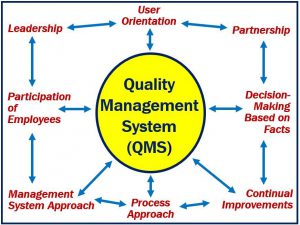AKAP Accreditation Organization

$380.00 – $420.00Price range: $380.00 through $420.00


Further details
ISO 9001 (QMS) is an international standard that provides the requirements of a quality management system. ISO 9001 is part of the family of standards published by the International Standardization Organization (ISO), commonly known as the ‘ISO 9000 Series’ or ‘ISO 9000 Family’. The standard looks for creating a system that manages quality throughout the organization.
This standard defines management as planning, controlling, guiding and supervising, and ISO 9001 is intended to be a quality approach.
The purpose of ISO 9001 (QMS) is to ensure that the organization implementing and running this standard commits to produce a product / service that has a stable quality. That is, if the product / service is produced at grade 2, the product / service will not be reduced to grade 3. What is most important in ISO 9001 is systematic thinking and process approach.
This standard (QMS) sees the organization as a system and, through a process-oriented approach to the organization, tries to create a good relationship between the organizational units so that in addition of improving the organization’s communication and quality of communication, it can present a better product and service to the customer.
The ISO 9001 standard (QMS) also attempts to create order by creating requirements in the organization’s documentation. Organizations need to document processes and measures that affect customer satisfaction and product / service quality and write specific ways for the organization to produce the same quality product / service.
Seven Principles of Quality Management
1) Customer Focus
2) Leadership
3) People’s participation
4) Process approach
5) Improvements
6) Evidence-based decision making
7) Relationship Management
ISO 9001 (QMS) is one of ISO’s most well-known standards, with more than 1.1 million certificates worldwide. It provides requirements to help companies demonstrate that they can offer their customers consistent, good quality products and services. It also provides a framework to help them streamline their processes and become more efficient at what they do.
ISO 9001 (QMS) can be used by organizations of all types and sizes. The standard has inspired a series of documents for sector-specific applications including for the automotive sector, the medical sector, local governments and more.
This International Standard specifies requirements for a quality management system when an organization:
All the requirements of this International Standard are generic and are intended to be applicable to any organization, regardless of its type or size, or the products and services it provides.
This International Standard employs the process approach, which incorporates the Plan-Do-Check-Act (PDCA) cycle and risk-based thinking. The process approach enables an organization to plan its processes and their interactions.
The PDCA cycle enables an organization to ensure that its processes are adequately resourced and managed, and that opportunities for improvement are determined and acted on.

Benefits of ISO 9001 implementation:
– Increase customer and consumer confidence
– Increasing the quality of products/services
– Reduce waste and losses in products/services and ultimately reduce costs
– Save on consumables and increase profits
– Planning, implementation of affairs in the form of a predefined international system
– Improve performance, increase productivity and speed in affairs
– Increase efficiency and customer satisfaction
– Reducing the number of complaints
– Improvement and uniformity in the quality of products/services
– Timely delivery of products/services
– Global competition
– Prevent or reduce unexpected events
– Earning points in tenders, obtaining ranks and grades from government organizations, providing evidence in exports
Other benefits are:
– Advertising use in headers, company site and all advertising matters
– Earn points in selecting sample units
– Reduce waste and waste time
– Creating confidence inside and outside the organization
– Transparency of processes and indicators
– Ensuring that customer needs and expectations are met
– Production of product/service with better quality
– Help with more marketing and sales and create demand
– Increasing the productivity and motivation of human resources
– Correcting errors and preventing their recurrence
– Improving communication within the organization
– Prevention of non-compliant product/service production
– Develop sales methods and provide after-sales service
ISO 9001 (QMS) is defined as the international standard that specifies requirements for a quality management system (QMS).
Organizations use the standard to demonstrate the ability to consistently provide products and services that meet customer and regulatory requirements. It is the most popular standard in the ISO 9000 series and the only standard in the series to which organizations can certify.
ISO 9001 (QMS) applies to any organization, regardless of size or industry. More than one million organizations from more than 160 countries have applied the ISO 9001(QMS) standard requirements to their quality management systems.
Organizations of all types and sizes find that using the ISO 9001(QMS) standard helps them:
$405.00 – $440.00Price range: $405.00 through $440.00
$300.00 – $330.00Price range: $300.00 through $330.00
$320.00 – $350.00Price range: $320.00 through $350.00
$320.00 – $350.00Price range: $320.00 through $350.00
$390.00 – $420.00Price range: $390.00 through $420.00